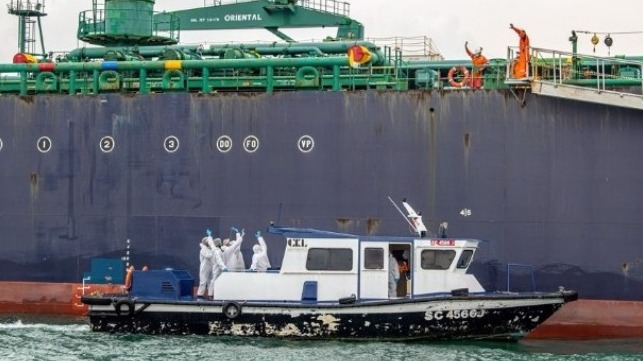ICS Warns Failure to Follow Protocols Undermines Crew Change Efforts

With new cases of COVID-19 emerging and uncertainty over the level of compliance with local protocols, and even possibly cases of outright deception, countries are again looking at tightening their restrictions on crew changes. This is prompting calls for better adherence to the protocols so as not to undermine the accommodations that have been achieved.
Singapore announced today that effective immediately it was tightening its rules on crew changes occurring at its port. This comes after widespread reports of abuses and even possible tampering of test results. The Maritime and Port Authority released new protocols saying, “with immediate effect, MPA will give priority to applications from Singapore-registered ships and applications for sign-off crew only," while saying it would consider cases where seafarers were beyond their contracts without an extension from the port state or in cases of compassionate leave or being medically unfit.
The rules for inbound crew to board a ship in Singapore say signing-on crew need to self-isolate for the 14-days before departing for Singapore, and that shipowners, managers, and agents must ensure accurate COVID-19 Polymerase Chain Reaction (PCR) tests. Seafarers are also being told that they must transfer directly to the ship upon arrival in Singapore, although some seafarers are reportedly hesitant to fly into Singapore because of the uncertainty of the situation.
Hong Kong is another example of a location that made accommodations for crew changes but is now expressing concern over the increase in cases and the potential need for stricter regulations or possibly suspending crew changes entirely. In late June, nine seafarers flew into Hong Kong and stayed in local hotels before boarded the MSC Flavia as part of a crew change. By the time the vessel arrived in China, 11 crew members tested positive including several of the seafarers who had boarded the ship in Hong Kong. Chinese health officials said they believed the individuals had been asymptomatic when they arrived in Hong Kong.
Hong Kong later tightened the restrictions on arriving crew members saying they needed to have negative tests and go directly to and from their vessels and the airport when all possible. However, there are now reports that crew members tested positive on at least six ships arriving in Hong Kong in recent days for crew changes with all of the ships now quarantined.
Cases such as these prompted the International Chamber of Shipping to issue a new call urging everyone involved in the shipping industry to strictly adhere to crew change protocols that have been developed to facilitate the safe crew changes. According to the ICS, recent failures to strictly comply with crew change and health guidelines, are putting in danger the hard-won accommodations from countries around the world.
“We must remember that the vast majority of shipowners are going to extraordinary lengths to safely repatriate crew and return them home to their families. Acts that are only made possible by governments adopting the crew change protocols,” said Guy Platten, Secretary General of the International Chamber of Shipping. “We must stand firm as an industry and work together to ensure we maintain the highest standards possible. Continuing on the positive momentum gained over recent weeks to ensure that we get back to 100% crew change.”
In issuing its latest message, the ICS commented on what it called alarming reports of ship managers and individuals failing to comply with national crew change guidelines. They pointed to the reports of crew arriving in Singapore with Covid-19 symptoms, saying that it is clear that some seafarers and crew and manning companies are not taking seriously the protocol of self-imposed isolation that countries have mandated as well as other rules designed to implement crew changes and maintain the safety of the citizens.
The ICS said that these instances of noncompliance are putting the industry at risk of severe setbacks. “The industry cannot afford to lose the faith and support of governments. The irresponsible actions of a small minority could potentially lead to the shutdown of crew change processes at important shipping hubs, impacting the vast majority of seafarers and shipowners who are acting in accordance with the protocols.”
The myriad of different rules and regulations are also creating challenges for shipowners and creating the potential for abuse according to observers. Two weeks ago, after the International Maritime Summit hosted by U.K. Transport Secretary, countries pledged action to address the issues creating challenges to completing crew changes. Despite issuing a joint statement, the protocols vary greatly by country. Further, in some cases, such as Brazil, individual ports have been permitted to set rules and protocols as opposed to a national system.

that matters most
Get the latest maritime news delivered to your inbox daily.
Despite the issues, ship agents report that they have been able to complete crew changes providing some relief to the situation. The ICS in its latest statement says that there are now over half a million seafarers impacted by the ongoing crew change crisis, with over 250,000 seafarers remaining trapped at sea. It fears that the progress will be eroded if the protocols are not followed and shippers and seafarers do not work to stop the spread of the virus.
